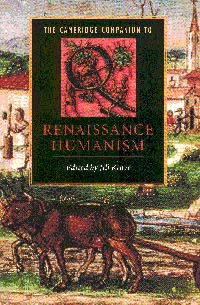Book contents
- Frontmatter
- 1 The origins of humanism
- 2 Classical scholarship
- 3 Humanism in script and print in the fifteenth century
- 4 The humanist reform of Latin and Latin teaching
- 5 Humanist rhetoric and dialectic
- 6 Humanists and the Bible
- 7 Humanism and the origins of modern political thought
- 8 Philologists and philosophers
- 9 Artists and humanists
- 10 Vernacular humanism in the sixteenth century
- 11 The new science and the traditions of humanism
- 12 Humanism and Italian literature
- 13 Humanism and English literature in the fifteenth and sixteenth centuries
- 14 Humanism and seventeenth-century English literature
- A guide to further reading in English
- Biographical index
8 - Philologists and philosophers
Published online by Cambridge University Press: 28 May 2006
- Frontmatter
- 1 The origins of humanism
- 2 Classical scholarship
- 3 Humanism in script and print in the fifteenth century
- 4 The humanist reform of Latin and Latin teaching
- 5 Humanist rhetoric and dialectic
- 6 Humanists and the Bible
- 7 Humanism and the origins of modern political thought
- 8 Philologists and philosophers
- 9 Artists and humanists
- 10 Vernacular humanism in the sixteenth century
- 11 The new science and the traditions of humanism
- 12 Humanism and Italian literature
- 13 Humanism and English literature in the fifteenth and sixteenth centuries
- 14 Humanism and seventeenth-century English literature
- A guide to further reading in English
- Biographical index
Summary
In the Renaissance the discipline of philosophy was based on ancient systems of thought: Aristotelianism predominantly, and to a lesser extent Platonism, Stoicism, Epicureanism and Scepticism. This continued to be the case well into the seventeenth century. As specialists in the study of classical antiquity, humanists were therefore able to make an important contribution to philosophy in this period: rediscovering ancient philosophical texts that had been lost or neglected for centuries and supplying editions, translations and commentaries both for these works and for other classical texts which had been part of the philosophical curriculum since the Middle Ages.
Though philosophers and humanists shared an interest in the same texts, their methods of approaching this material differed radically. Humanists believed that philosophical discourse, like all forms of learned communication, should be composed in a Latin style modelled on the best classical authors. The stress they laid on clarity, persuasiveness and, above all, eloquence was a deliberate challenge to the scholastics, who monopolized university teaching of philosophy and who wrote in a technical, jargonladen language, incomprehensible to non-philosophers. More importantly, humanists studied philosophical works in the same manner that they dealt with literary or historical texts, that is, as philologists.
- Type
- Chapter
- Information
- The Cambridge Companion to Renaissance Humanism , pp. 142 - 160Publisher: Cambridge University PressPrint publication year: 1996
- 14
- Cited by

